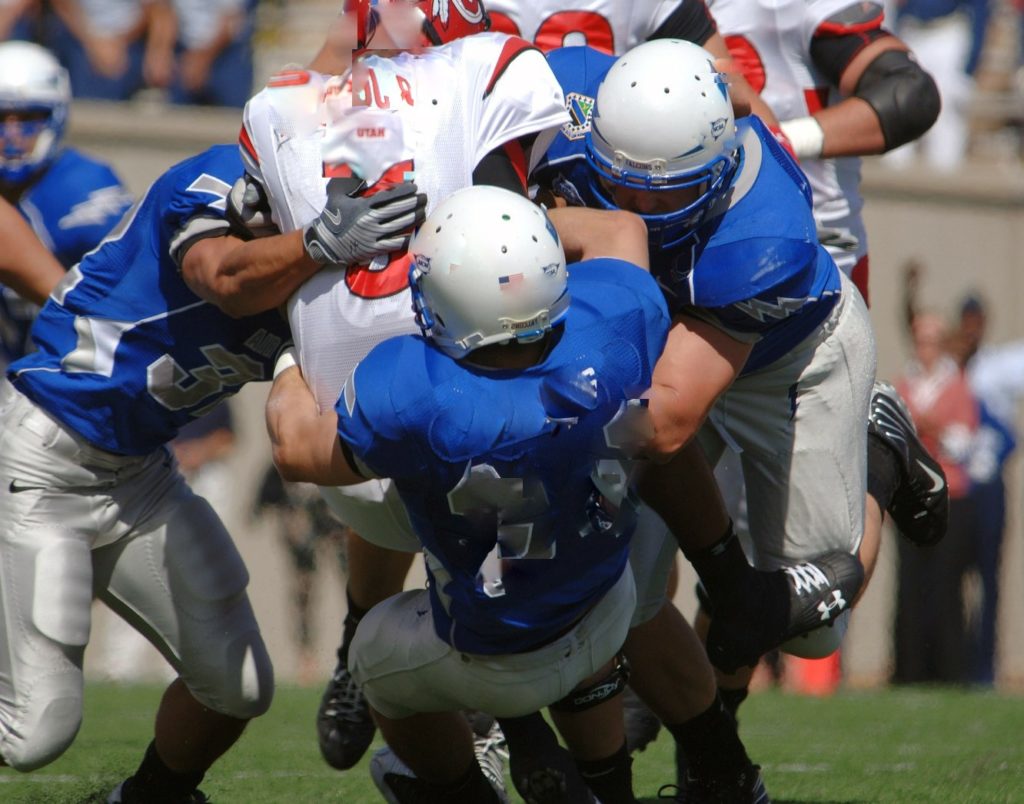You Have to Develop the Character of a Person to Maximize Their Athletic Potential

Located just off the Mississippi River, about 10 miles West of New Orleans is the Louisiana bayou town of River Ridge. Here in this small town is one of the nation’s most dominant high school football programs: John Curtis Christian High School.
The non-denominational Christian school opened in 1962, named after its founder John T. Curtis Sr. The school’s mascot is a Patriot, with school colors of red, white, and blue.
The architect and current coach for the program: John T. Curtis Jr, or JT Curtis. As a 22 year old head coach back in 1969, he held steadfast to his belief in himself, enduring an 0-10 season in which the Patriots scored two touchdowns total.
Fast forward to present day (2018), where JT Curtis HS has:
- Won 27 state championships since 1975
- Been nationally ranked on several occasions including #1 in 2012
- Had over a dozen undefeated seasons
- Accumulated an overall record of 572-64-6, most wins among active coaches and second all-time
- Have been ranked by MaxPreps as one of the greatest high school football dynasties of all time
JT Curtis Football Overview (2004-present)
Season Record National State
2004 14-0 77 2 (State Champ)
2005 10-1 5 (State Champ)
2006 14-0 42 1 (State Champ)
2007 12-2 3 (State Champ)
2008 14-1 3 (State Champ)
2009 13-1 6 (514pf vs 89pa)
2010 12-2 10
2011 14-0 5 (603pf vs 93pa) (State Champs)
2012 16-0 1 1 (800pf vs 80pa) (State Champs)
2013 11-2 2 (State Champs)
2014 12-2 4
2015 8-3 5
2016 11-1 4
2017 11-2
2018 13-0 18 1 (State Champs)
Curtis, the school’s current Headmaster, Athletic Director, and Football Coach, has surrounded himself with a great faculty and longtime coaching staff, of which many are close family members. This close knit family environment, in which Curtis and his staff recognize three important things:
- 1. The kids want to know you love and care about them,
- 2. The kids need for learning discipline and commitment
- 3. The kids want structure
This has led to an incredible amount of success both on and off the field for students, athletes, and alumni of JT Curtis.
Commitment
This is the one word that coach JT Curtis used to describe the culture of the JT Curtis High School Football team. According to Curtis “What I ask our players to do is if they want to play football then they must know a couple of things right off the bat. 1: I am not going to cut them. 2: Positive attitude and work ethic every day. If they do those two things, I am going to work with them every single day they are there. Their responsibility is to make sure they are there. No excuses. They are going to make a commitment to be there, with a positive attitude and effort. My commitment to them is to give them great coaching every day.

Spring ball, etc, we are in a marathon race, not a sprint. That commitment is really important, and it takes time for them to really grow and understand that. Freshman and guys coming into the program see that we have established that culture with the older guys who serve as examples to those new and younger guys.
When the kids begin at our school, we interview all the parents that come in. We look at the grades. That is what I expect of all the athletes regardless of what sports they play. They are going to be committed year round. They will have off-season work, academics, community, etc. This is also the expectation we teach to the parents as well.
This does not mean the kids has to be the star player. After 4 years I want that kid getting that diploma knowing that he maximized his potential. People that live in regret are coulda, woulda, shoulda. I did all I can do is what we want our kids saying.
Many kids do want to play college football, but with time, reality starts to set in. But we do want them to enjoy playing high school football and giving their best effort. We want them learning the life lessons associated with the sport they are playing. We want our kids all going to college whether they play football or not.”
Inflection Points
Curtis recalls “That happened twice in 1973 and 74 and 75. 73 was the first team I had that was capable of competing for a state championship. I set their team goals too low. We set the goal for district championship. We lost to the team that won the state title. I eliminated team goals at that point. I don’t have any goals. Our objective is to walk on the field and play as well as can for full 48 minutes. Our goal is to walk off the field knowing we did everything we could. We may not always be happy with the result.

1974 was a volatile time in our country. Anti-establishment movement, recreational drugs etc. Our 74 team had a chance to be really good and we fell short. Guys were doing things they shouldn’t have been doing, trying to fit into society. It was new then. In the off-season kids were telling me they were talking to one of the guys and couldn’t understand what he was saying. We called the staff together and made a commitment that we are going to have guys that want to play football and play together. Guys that weren’t interested in that outside stuff.
Then, that year, we had our first serious off-season program. We run them to help improve their skill and speed, not to hurt them or frustrate them. We started running after school on the first of march through may that year. We had 14 or 15 guys that quit the team.
With this new level of commitment and off-season program, we went into the 75 season and won the state championship. We won it with guys that wanted to put the work in and win. This showed us that the level of commitment we were looking for really worked. We still have some problems, but overall the culture of the kids is great. They are committed and they know the level of commitment required to be a part of the program.”
Trust
Curtis shares “We address trust. This manifests itself in a lot of different ways. Playing time, starter, position, etc are all issues. The kids and parents must trust that the coaches are doing the best they can do. We talk about this on a regular basis. Just as importantly I have to trust them. I have to trust them to do and execute what we have been teaching. It is a mutual trust that is built with time and confidence.”
Expectations
“Our goals are a mindset now. We try to not vary at all. Whether we are playing the best or worst team in the league, we try to be consistent. We want to give everything we have each week; the process does not change very much. The kids buy into that in terms of consistency. I think consistency brings about great performance and continued success.
Periodically I say to them after a great win, “what did we change this week?” after a great win. They always say, “we didn’t do anything different.” We seek consistency” reflects Curtis.
Culture and Strategy
Curtis expresses “I think the culture is extremely important. The strategy is execution. If you cannot execute greatly, you are barking up the wrong tree. The mindset of this team is; the other team is in a dog fight. They will remember playing us. We are going to continue playing hard throughout the game. As an example, we have gone through seasons with several shutout games in a row. We will be up by 35 points with the second guys in. We need to let those guys stay out there and face the adversity of the situation if a team starts coming back. We talk in terms of physicality, performance, execution, etc.”
Cultivating the Person and Athlete
According to Curtis “You have to tie them together. You have to develop the character in a person to maximize his athletic potential. Just because you are a good athlete doesn’t mean you have maximized your potential. This is a real challenge. They can be successful without great athletic potential. That comes to the character of a kid, to work when nobody is watching. We talk about character and doing things when nobody is watching. You can cheat the rep, the only one you have cheated is you the person.”
Teacher and Coach
“A coach is no more than a classroom teacher on the field. If he is not understanding as a teacher and motivator, he won’t have continued success” believes Curtis.
Adversity
Curtis believes “You have to create it in practice, so when they get to the game it is something they respond positively to. When we are practicing 2 minute offense, we would rather be in 2 minute defense ahead in the score. We will set up 2-3 series and if the group is not successful, the second group comes on. I then end it and tell them we lost, and the game is over, as we did not execute properly. We have to make the corrections so we don’t make the same mistakes. We create the adversity.
As a coach you have to create those situations in practice where you are not going to be successful on both offense and defense. We learn the things we need to improve on by doing this.”
Dealing with Entitlment
“When we do have some, it dissipates pretty quickly. Everybody is going to be treated equally here. We had a running back here a few years ago. He went to USC. During his senior year somebody said to me “you know what is really impressive to me, I couldn’t pick joe out of the crowd.” You could see it athletically, but he was just part of the crowd doing the work with the rest of the team. Joe ran the routes against the defense in practice. There are no stars here. There are no stickers on helmets. There are no individual stats. I believe that every player out there deserves the opportunity to be coached equally. We work hard to do that. If we do deal with entitlement they usually leave.

There is no doubt the hardest working athletes are often the humblest.
We have been very fortunate to this point, where all the athletes buy in and feel like they are part of this team no matter how good they are at football. I expect a positive attitude and great work ethic. One of the things I tell them: “It’s August, how many of you all see me come out on this field and not be ready to practice? Nobody raised their hand. One senior said, “coach I have been here for 4 years and never seen you like that.” I told them there are days when I don’t want to be out here, but we cannot be successful if I am not here, present and prepared. When I walk on to that field, I am ready to coach and do the best I can. You will never know if I have had an adversity. Kids need to know it is alright if I have a headache, tired, etc, but when I am out on that field coaching, I am doing the best I can for them” shares Curtis.
Coaching Evolution
Curtis reflects “Over the years I have learned to be a little more patient and to not give up on kids. I think those two things are important. We have really maintained the same kind of mindset throughout. The 73-75 seasons were true life changer to me in terms of kids learning the commitment it takes to succeed. I also re-emphasize the value of athletics.
What I have grown to know, if the only thing left at the end of the game is the score, somebody won, and somebody lost. I do not think it is worth the time, money, etc to think of it as just wins and losses. I think over the years intrinsic values have grown to be a bigger factor for me. I have focused on those intrinsic values of honesty, integrity, and consistency. These are all invaluable. The program should teach that and if it doesn’t it is probably not worth playing.”
The Privilege of Playing Football
“The college kids will express how well they were prepared for college. They are grateful and realize what a privilege it was to play here. They express how they were well prepared for the simple things like how they practice and the off season program. When football ends in college there is a whole facet of other things they need to prep for. We expose them to a lot in high school. They have been through a good off-season program, weight program, summer program, and there are no real surprises to them when they go off to college. Through this they were never able to gain a sense of entitlement.
The kids will tell us how they could just outwork people. Those things are really rewarding as a coach. The large percentage of them are now very strong contributors to our society and are good people” expresses Curtis.
Values
According to Curtis “As a Christian School, Christian values are extremely important to us. My father used to say, “if we turn out the best student, best athlete, or combination of both, and they are amoral people, we have failed. We have failed them and our society.” Moral, ethical values from a spiritual perspective are critical to us. This needs to be something you talk about constantly. We plant seeds, but we don’t necessarily see the harvest right then. You have to give continuous opportunity to understand value systems. That is first and foremost.

Secondly, we want a strong person both academically and athletically, and don’t separate those two. In sport, success is not only based on what you do on the field, but it is also based on what you do off the field. It is the same with academics. It is the homework you do. It is the work you do in the off-season. What you do on the field is important, but just as important as what you do off the field.
I want the kids to be academically sound first. This can still be a challenge. We have had kids that had to go to summer school. The athlete creates the situation. He has the opportunity to learn from this and learn how to ask for help.
My Dad started the school. I didn’t play here, but my brother did. My dad just saw a tremendous need for a Christian education without denominal valuation. My first year as a coach we were 0-11; we scored 2 touchdowns. There is no bravado, no bull in it, it is what it is. I can go to bed at night knowing we are doing the things that are important and sleep well. One of the best feelings I have is walking home, knowing that I have seen a player improve. That is a truly great feeling. Realizing that person has made the strides to improve as both a player and person. That is why it doesn’t seem like a job. It doesn’t seem like 45 years. Been doing this since I was 22. It is not work to me.
Our women’s basketball coach was offered another job this year. She came to me and I told her to talk with them. The other school’s AD tried to say to her, “here you are going to have the same emphasis as the football team.” The invitation was that football gets all the attention. She told him, that he really doesn’t understand that JT is just as passionate about her women’s basketball team as he is the football program. That is the key. Every sport we have, I want them to do the things we talked about. I don’t care about wins and losses. That will come. But if you don’t do these other things, you will not be successful as a coach.”
Building Confidence
Shares Curtis, “There are times when the process is going to be hard, but it doesn’t have to be a negative. We have to find a way to work through our adversity. Younger kids will come to you some days and say, “coach I don’t feel good today.” I know what they want me to say. Tell you what let’s do this, go ahead and dress and do what you can do. If you don’t feel good just step out. 98% of the time they go through 90% of the practice. When we are walking off the field, I make it a point to go over to them and tell them, nice job. I say, “see you could really do some things you didn’t think you could do.” What a building block for confidence and success. You create those situations where they realize they can do more than they thought they could do. If I look in a kid’s face and he is really hurting, I will send him home. Give the kids the chance to believe in and overcome themselves. That is our biggest reward as a coach.”
Thanks for reading!
For more on How To Build A Winning Culture In Team Sports check out our blog or pick up your copy of the book Building A Winning Culture In High Sports……And Beyond!
For much more on training, strength and conditioning, stress resiliency, body composition and more, click on our blog or other books including Why You Store Your Fat Where You Do, Workouts For Working People, Lean Body Solutions, Stress Management and more. Also, stay tuned for our two new books due out this summer!



